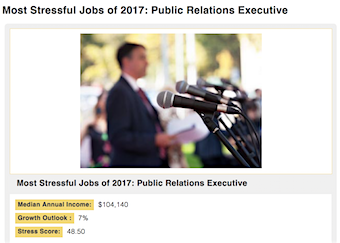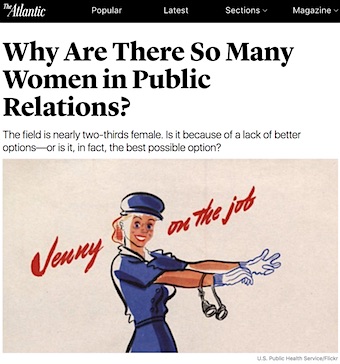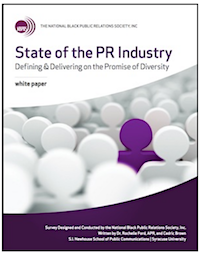PR executive is No. 8 on Careercast’s 2017 list of the ten most stressful jobs. No. 6 is newspaper reporter. Both cause each other a lot of stress.
The PR executives are “the face” of public entities such as business, government, institutions, non-profits, celebrities and athletes, says Careercast which has for many years put PR jobs in its “top ten” stress list.
 |
The services of PR people are most needed “at times of crisis,” says Careercast. They have to do “damage control.”
A problem for PR people is that they don’t have ultimate control of what is said or communicated, says Careercast.
It quotes Christina Nicholson of MediaMavenAndMore who said, “When the end goal is out of your control, it becomes stressful.”
Trump Trashes PR--Seitel
Adding to the stress of PR people is the slam-bang approach of President Donald Trump to public communications.
Fraser Seitel, author of The Practice of PR, headlined his O'Dwyer column this week with, "Donald Trump and the End of PR."
Seitel says the "trusted PR advisor may be destined to go the way of the floppy disk" since Trump has violated so many basic principles of PR sich as "Never lie," "Always check your facts," "Never attack the media," "Don't bad mouth your adversaries," "Always keep your word," and "Always take the high road."
PRSA/NY Panel Saw Ethical Dilemma
"The PR person doesn't have the final say" but can only "fight" and "make their voice heard," Ruder Finn's Michael Schubert told the "PR Ethics Trial" of PRSA/New York Sept. 8, 2014.
Said Schubert: "At the end of the day, you don't have the final say. You really don't. And having been there, arguing for the right thing to do and hearing the lawyer say, you can't say this and you can't say that, I think that's a reality and you should understand that…"
The chapter's 1.5-hour event laid bare many of the dilemmas, conflicts and quandaries facing PR people that make it one of the most stressful jobs—No. 5 for 2013 on Careercast's list of stressful occupations.
 |
As noted by an Atlantic article, most of those now shouldering this burden are women. Some are new mothers.
Prosecutor Paul Holmes of The Holmes Report voiced alarm that PR people are using social media "to get as much past the gatekeeper (journalists) as they can."
Consumers are not aware of the "game" that is being played by PR and the press which puts an added burden on PR people to be "even more honest," he said.
Discussion brought out that PR people who discover illegal or abusive practices of clients can only resign the account and cannot report this to anyone.
Panelist Steve Cody of Peppercomm said his firm has resigned many accounts because of ethical objections. However, he would not name any of them.
The jury (audience members) listened to the argument about whether PR is "deceptive, non- transparent and of little value to clients or society."
PRSA's NY chapter staged the event at SUNY's Global Center on E55th St. It drew more than 80 people.
Holmes was prosecutor while Schubert, Ruder Finn's chief innovation officer, countered as defense attorney. Randy Cohen, who wrote the New York Times "The Ethicist" column, was the judge.
Raps Intellectual Dishonesty
Holmes said the PR industry at times relies on spin and practices intellectual dishonesty. Trouble mostly occurs when the focus is on "transactional" rather than strategic PR, he said.
PR is tarnished by hyperbole, lack of identification of paid spokespeople, failure to exhibit moral courage, and omission of pertinent facts in order to burnish the reputation of clients, said Holmes.
Tonight’s Black PR History Month program, which has been shifted to offices of Edelman at 250 Hudson st. near the Holland Tunnel, program will include appearances by the heads of the Arthur Page Society, PR Council, Institute for PR, Arthur Page Center, PRSA Foundation, PR Student Society of America and the Plank Center to discuss their current initiatives promoting diversity in the PR field.
Patrick Ford, vice chair of Burson-Marsteller, is emcee at the event.
Study Showed Few Blacks in Top Posts
 |
A study by the National Black PR Society shows that while black PR practitioners are making progress in mid- and senior-level positions in the PR industry, they are still unable to break into the executive suite.
“There’s no speaking about jobs and contracts without addressing the lack of blacks at the senior level in agencies and corporations, and systematic programs in place to correct the situation,” said Deborah Hyman, NBPRS immediate past president.
Of the 20.6 percent of respondents working in the corporate sector, none were executive level professionals, senior vice presidents or chief communication officers.
Mike Paul, SVP-corporate communications, Publicis Media, handling PR for the U.S., Canada and Mexico, has long campaigned for companies to give executive posts to people of color and all minorities. He skipped the 2015 meeting of Seminar, a group of top PR executives, to protest the almost complete lack of people of color in the group.
O'Dwyer Readers Deny "Discrimination"
A poll on the O’Dwyer website Jan. 13-19, 2017 asked whether the ad/PR industry practiced “discrimination” or whether talented blacks were attracted to other industries. The vote was 6% for the former and 94% for the latter.
Talented people of all backgrounds see the numerous corporate and political pressures that affect the way PR people do their jobs. They often report not only to the CEO but to legal, marketing, and financial. It’s like carrying a heavy burden while walking on thin ice. Keeping silent and shielding others from press questions are sometimes what is required.
Careercast in 2011 it rated “PR officer” as the second most stressful job, moving it up six places from No. 8. “PR executive” was No. 5 on its 2013 list of the ten most stressful jobs.
PR executives are required to do “damage control” which means they have to “think and act quickly under stress,” says CareerCast. “They live in the public eye.” They are also “on call” 24/7 because “news never stops” and they must deal with “potentially hostile” reporters. The occupation is very attractive to recent college grads which makes “getting and keeping a good job that much more difficult,” it adds.
McCaskill, PRSA Director, Is Being Contacted
Andrew McCaskill, SVP of global communications of Nielsen, as the only black on the 17-member board of PR Society of America, has a special duty to see that the Society lives up to the high ideals of Martin Luther King as well as the high ideals of Nielsen and PRSA. He represents the Tri-State district of New York, New Jersey and Connecticut.
We have not yet been successful in obtaining a response from McCaskill. Laurent Lawrence, PRSA director of PR, an African-American, also does not deal with this reporter nor does Laura Kane, chief communications officer.
Talented people of all stripes note that PR people are unwelcome on the staff of PRSA. It should not only be a major employer of them but set an example of the highest ideals of PR. There were many PR people on the staff in the 1960s and 1970s when ex-journalist Rea Smith presided. A press-friendly culture was present that included inviting reporters to be Silver Anvil judges. That culture ended in 1980 when Patrick Jackson became president. He was the owner and editor of the weekly PR Reporter newsletter.
PRSA Silenced McClennan of Publicis
Publicis executive Mark McClennan, who was 2016 elected chair of the Society, has not been allowed to answer an email or phone call from this reporter. We don’t think any self-respecting black would submit to such blockage in press relations given the Society's commitment to the "free flow of information."
The Society has just relocated h.q. to another office downtown without subjecting the decision to the Assembly or the membership. Most PR/ad/media companies and associations are in mid-town. The membership should have had a voice in this decision.
PRSA should again open member contacts to the press, which was the practice until 2006. The APRs, which control 16 of the 17 board seats in 2017, should give up control since they do not represent the 82% of members who are non-APR.
The assistance of McCaskill and the other national board members is needed to accomplish these and other reforms.
PRSA Will Be Picketed
The intransigence of the PRSA board and staff is similar to the stubbornness that citizens of Westhampton Beach, N.Y., met when they asked that the appointed board of the local library be replaced by an elected board. Public picketing led to the resignation of most of the board.
Critics opened freewesthamptonfreelibrary website and campaigned for an elected board. They decried board plans to spend nearly $3 million on construction on a seven-year-old building and plans to spend $1 million on a parking lot when the library is little used from October to May.
The critics, rebuffed by the library board, whose president Tom Moore is the husband of Westhampton Beach Mayor Maria Moore, took to demonstrating in front of the library and passing out literature on Main st.
Three trustees of the Westhampton Library board, including president Joan Levan, bowed to public opinion Oct. 30, 2015 by resigning from the board. Their replacements were criticized on the ground they were not democratically elected.
Resigning besides Levan were trustees June Sellin and Marth-Ann Betjemann. Appointed to succeed the three were Tom Moore, Barbara Matros and Susan Rosenberg.
The appointment of Tom Moore brought howls of protest from the more than 60 residents present at a meeting that lasted an hour and a half who considered it a blatant conflict of interest.
Unfairness of PRSA To Be Publicized
This writer will march in front of the offices of PRSA at 120 Wall st. carrying a sign that says, “Public Relations Society of America is unfair to members, the press and the PR industry.”
Literature will be passed out documenting our claims.



 Have a comment? Send it to
Have a comment? Send it to 
No comments have been submitted for this story yet.